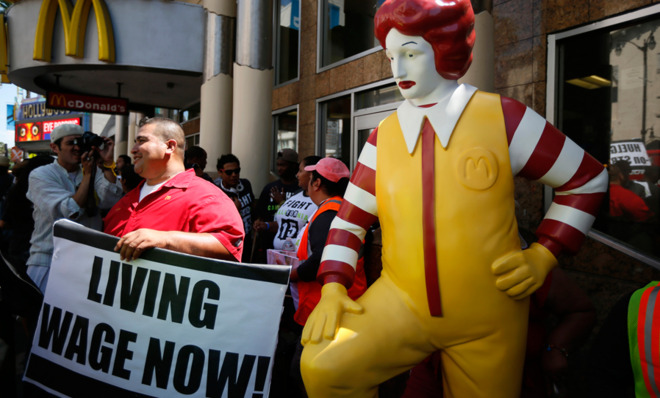Most Americans want a higher minimum wage. So what's holding it back?
Polls show 76 percent of Americans support a $9 minimum wage. That doesn't mean Congress will pass it.

A free daily email with the biggest news stories of the day – and the best features from TheWeek.com
You are now subscribed
Your newsletter sign-up was successful
Raising the minimum wage is almost always popular with the general public. Back in March, after President Barack Obama originally pushed the idea of raising the federal minimum wage to $9, 71 percent of Americans supported him.
That number has grown. Yesterday, Gallup released a new poll showing that 76 percent of Americans would welcome a $9 minimum wage. That support crosses party lines:
Yes, Republican voters are the most resistant to the idea, but a clear majority — 58 percent — are on-board.
The Week
Escape your echo chamber. Get the facts behind the news, plus analysis from multiple perspectives.

Sign up for The Week's Free Newsletters
From our morning news briefing to a weekly Good News Newsletter, get the best of The Week delivered directly to your inbox.
From our morning news briefing to a weekly Good News Newsletter, get the best of The Week delivered directly to your inbox.
At 76 percent, a minimum wage hike is more popular than: Apple (72 percent), Mexican food (69 percent), and romantic comedies (67 percent). For anyone who has watched Love Actually on an iPad while eating a burrito, this, truly, is an impressive statistic.
Considering the inverse relationship between support for a $9 minimum wage and the number of Americans who have an unfavorable view of Congress (85 percent), it seems like it would be an easy sell in Washington. But the minimum wage hasn't been raised since former President George W. Bush was in office. That was in 2007, when Congress approved a raise from $5.15 to $7.25.
Who, exactly, is holding it back? Republicans in Congress, especially House Speaker John Boehner (R-Ohio).
(Related: What should the minimum wage be?)
A free daily email with the biggest news stories of the day – and the best features from TheWeek.com
"When you raise the price of employment, guess what happens? You get less of it," said Boehner back when Obama mentioned a minimum wage hike during his State of the Union address in February. "At a time when the American people are still asking the question, 'Where are the jobs?' why would we want to make it harder for small employers to hire people?"
It's doubtful his opinion has changed since then, meaning he would probably ignore a bill currently being drawn up in the Senate to raise the minimum wage to $10.10, with automatic increases tied to inflation.
Not that it would necessarily get through the Democratic-controlled Senate either; it would still need to pass the 60-vote threshold to avoid a filibuster, and many Republican senators, like Marco Rubio (Fla.) and Lamar Alexander (Tenn.) — who wants to eliminate it all together — have said that they are firmly opposed to the idea.
A similar bill has been drawn up in the House, but considering the fact that a proposal earlier this year by Rep. George Miller (D-Calif.) to raise the minimum wage to $10.10 garnered support from exactly zero House Republicans, that is pretty much a dead end.
One possible factor: Businesses that depend on low-wage workers, like Burger King, McDonald's, and Taco Bell, have firmly opposed raising the minimum wage, even as they endured worker strikes all summer.
With libertarian-leaning Republicans like Wisconsin Rep. Paul Ryan ("I have never been a fan of that idea") and establishment, pro-business Republicans like Boehner against it, there is little chance of bipartisan support for a minimum wage bill. Democrats, with their eyes on the positive poll numbers, undoubtedly see this as an opportunity to score some political points before the next election.
"Yes we are," Sen. Jay Rockefeller (D-W.Va.) said when asked by Politico if Democrats were serious about passing a minimum wage increase. "But we have to recognize that the other party is not serious."
Keith Wagstaff is a staff writer at TheWeek.com covering politics and current events. He has previously written for such publications as TIME, Details, VICE, and the Village Voice.